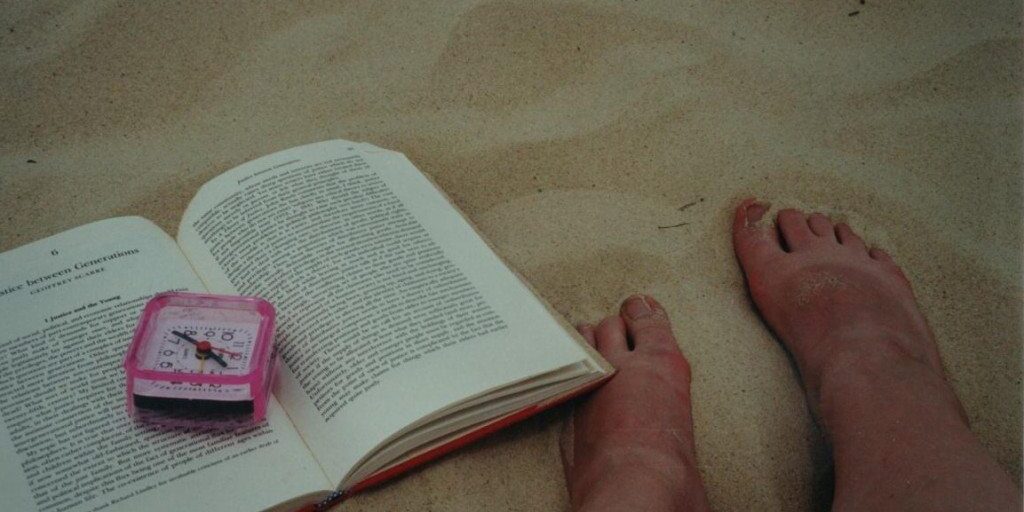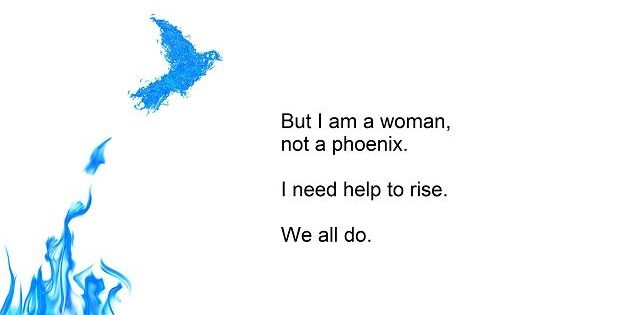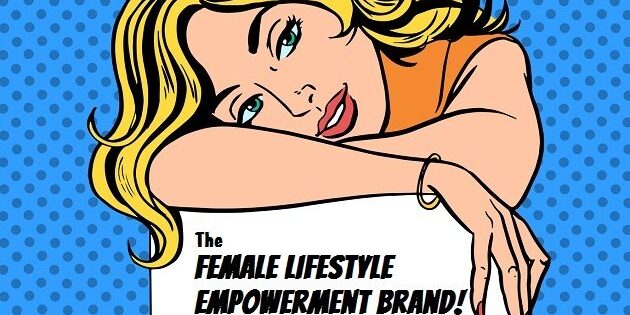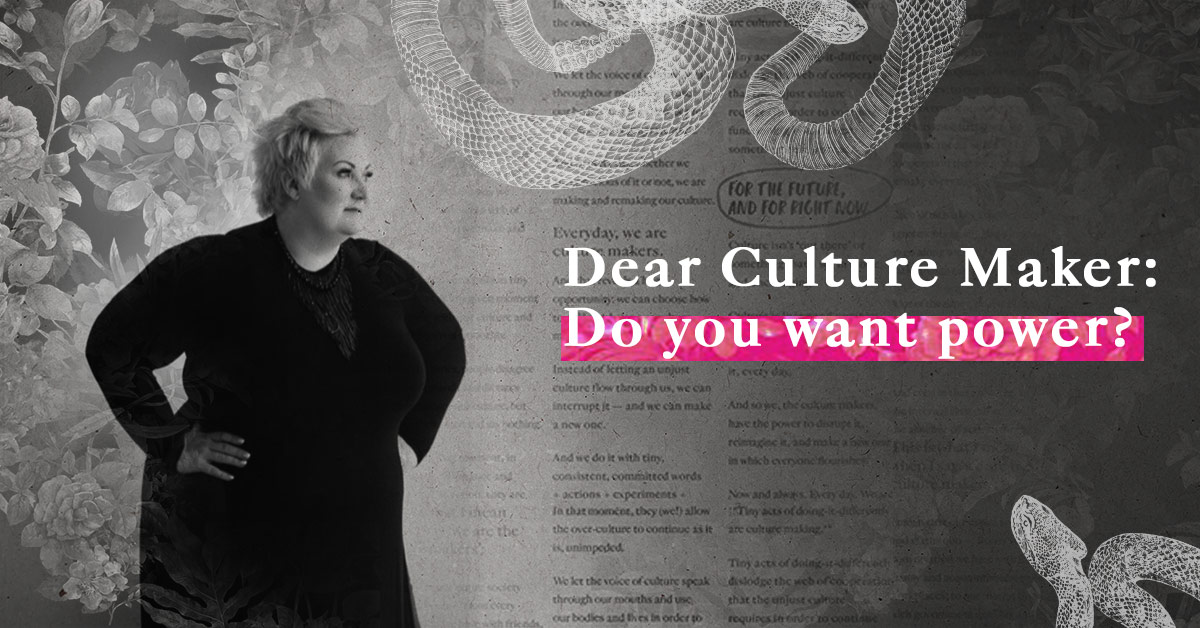
Dear Culture Maker: Do you want power?
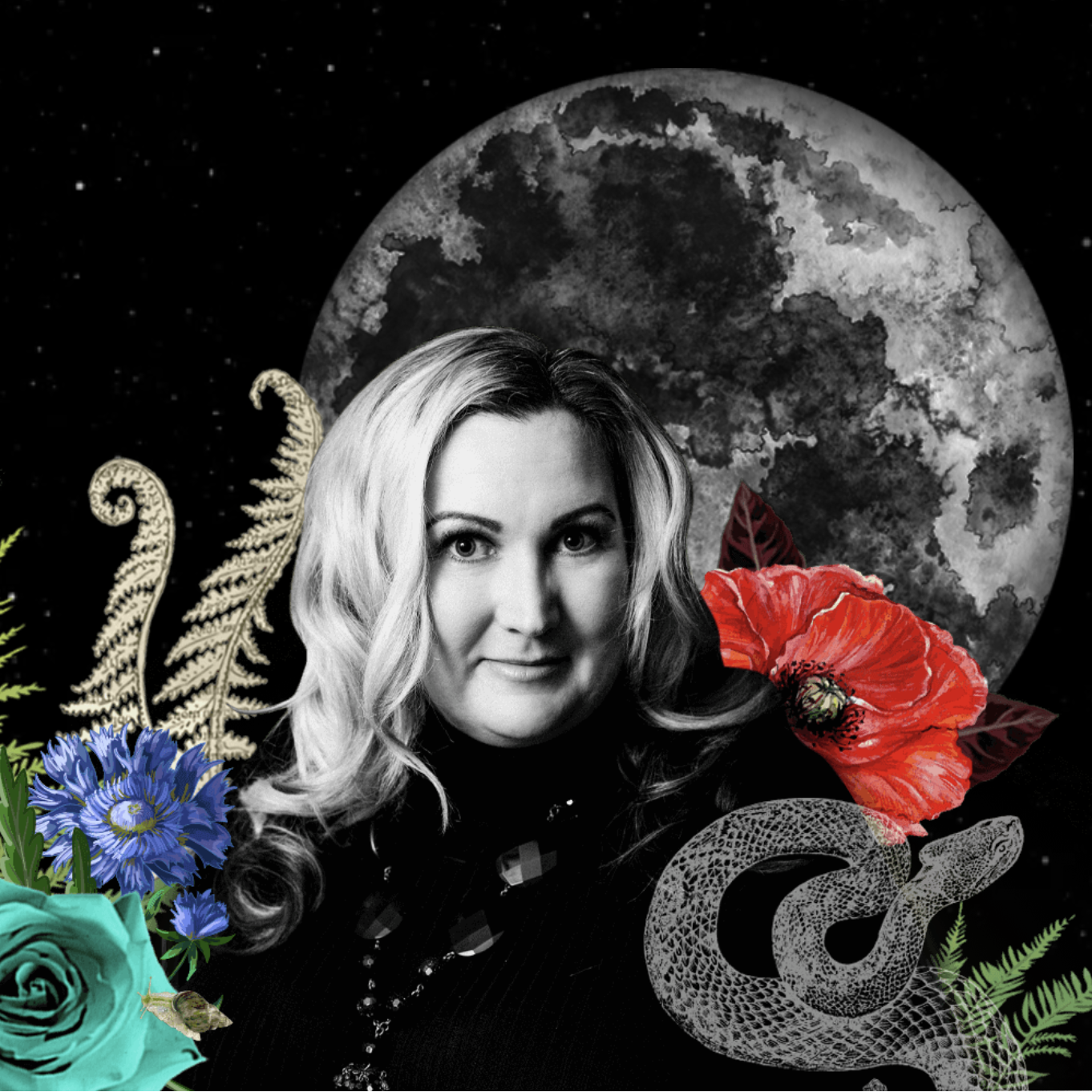
Culture-making is like breathing: we’re doing it even when we don’t know we’re doing it.
***
“Power is the ability to make other people do what you want!” roared Dr. Feaver from the lectern of our political philosophy class.
He’d asked the class to define power, and then, frustrated with our definitions, screamed The Right Answer at us. He ranted that those of us who’d volunteered The Wrong Answers — honours Poli Sci students, all — were obsessed with power specifically because we didn’t understand power. That’s why we studied politics; that’s why we couldn’t properly define power.
You know the old saying that those who can’t, teach? That’s what he was saying about us. According to him, we studied power and critiqued power because we didn’t have any and were scared to get some.
At the time, he was in his late sixties and the father of a baby and a toddler with a twenty-something year old former student, so I guess you can say he was living his philosophy. I could go on, but I’m going to take this opportunity right now spare all of us several pages linking his beliefs about power with his private behaviour with students and women and women of colour. You already know. There’s nothing to wonder about. What I’m wondering is this:
Is that what power is?
Force? Domination? Making other people to do what we want?
***
Related: in a fork-in-the-road/road-less-traveled time of my life (I refer to it as Year Thirty-Sex; I’d just gotten divorced), I told a male friend of mine, my confidante, that the new guy I was dating was into spanking (giving them, not getting them). Even though it wasn’t really my thing, I was going along with it because I was trying to be what Dan Savage calls “good, giving and game”. My male confidante said something like “That’s so common with feminists”. He completely disregarded the fact that the whole spanking thing was not my idea and I wasn’t 100% digging it (though, cool, if it was or I was) and used my conversation to reinforce his theory that feminists were preoccupied with social power specifically because they secretly had a fetish for being sexually dominated.
Obviously he is not my confidante any more.
Still, in the moment I laughed it off, because even though I’d slipped the grip of one man I was still firmly ensconced in the male gaze — still trying to be smaller, prettier; still biting my tongue; still being what Gillian Flynn calls The Cool Girl:
Being the Cool Girl means I am a hot, brilliant, funny woman who adores football, poker, dirty jokes, and burping, who plays video games, drinks cheap beer, loves threesomes and anal sex, and jams hot dogs and hamburgers into her mouth like she’s hosting the world’s biggest culinary gang bang while somehow maintaining a size 2, because Cool Girls are above all hot. Hot and understanding. Cool Girls never get angry; they only smile in a chagrined, loving manner and let their men do whatever they want…They’re not even pretending to be the woman they want to be, they’re pretending to be the woman a man wants them to be. Oh, and if you’re not a Cool Girl, I beg you not to believe that your man doesn’t want the Cool Girl. It may be a slightly different version – maybe he’s a vegetarian, so Cool Girl loves seitan and is great with dogs; or maybe he’s a hipster artist, so Cool Girl is a tattooed, bespectacled nerd who loves comics. There are variations to the window dressing, but believe me, he wants Cool Girl, who is basically the girl who likes every fucking thing he likes and doesn’t ever complain.
Now, I’m no longer trying to be any man’s Cool Girl and let me tell you, that comes with penalties and punishments and something bigger than both of them: liberation. Power.
I digress, but not really.
My point is that my male friend, like Dr. Feaver, thought I was interested in power because I didn’t understand it AND because maybe because I secretly liked it when it was used against me.
That’s one of the narratives that lets men AND OUR CULTURE justify rape and domestic violence, isn’t it?
She likes it like that. She’s asking for it.
Underneath that narrative is the conflation of men with domination and women with being dominated. As detective Stella Gibson says in the TV series The Fall (it’s actually a quote from feminist legal theorist, Catherine McKinnon):
“Man fucks woman.
Subject, verb, object”.
In other words: power is force, dominance, violence, and abuse.
Some people are born into identities of power and are free to use it against other people — indeed that’s what confirms their power and their identities — and everyone else is going to have to learn how to take it.
***
No wonder so many of us culture makers would never, ever utter this sentence: “I want power”.
I want to feel empowered…sure, we’ll say that.
I want to grow my business...yep, we can say that.
I want a promotion…
I want more money…
I want to grow my network…
I want to grow my platform…
I want to make an impact…
I want to create change…
I want to be the change…
I want to make a difference…
I want to be visible…
But rarely will we say, “I want power”.
Even though what all of those sentences mean is this: I want power.
***
Last December my friend Meghna Majmudar asked me a question about power. (Obviously it was significant or I wouldn’t still be talking about it and writing about it again, almost a year later.)
Meghna is a power + success coach who works with racialized women and immigrant professionals at the tops of corporate ladders; so when I say she asked me a question about power what I mean is that she made me do an exercise that she uses to facilitate her power-broker group of women VCs.(You cannot ever take the leadership out of a leader — not even on a chatty catch-up call.)
Thanks to her question/exercises, I realized I have this core belief about power:
That power will be used against me.
A lot of the time, when personal development leaders are talking about mindset or ‘limiting beliefs’, I get the impression that we’re supposed to be uncovering — and ditching — the false beliefs that have been distorting our lives. My belief about power that Meghna helped me excavate, however, wasn’t false, at all.
As a survivor of childhood sexual abuse, as a woman, as a fat woman, as the mother of black children, I have this belief because this has been my actual experience of the world. I think that’s probably the experience of most people with marginalized identities. In our broken, unjust system, this is how power currently works: it’s a system of domination and exploitation.
I think this is the mainstream definition of power, too: force. Coercion. Domination. And yes, like Dr. Feaver said, “the ability to force people to do what you want them to do.” That’s why in our mainstream narratives “succeeding” gets conflated with “crushing it” (or “killing it”) and even a conference for apparently progressive freedompreneurs gets named the “World Domination Summit”.
And that’s why the sentence “I want power” can be repellant to many of us.
Because we know what that kind of power feels like when it’s used against us.
But just because that’s the status-quo understanding or definition of ‘power’, however, doesn’t mean it’s true.
***
Last week I listened to a podcast called “Hear to Slay” by Dr. Roxane Gay and Dr. Tressie McMcMillan Cottom. There’s an episode called Badass Leadership 101 that is pure jet fuel. At one point they talk about the version of leadership held up to women by lean-in feminism; that apparently aspirational leadership advice is really be more like a white man.
And why, Roxane and Tressie wonder, would we ever lower ourselves to that?
OMG that was so refreshing.
Marginalized people are constantly being told to fix their confidence, change their appearance and change their language; women are told to “level up” and lean in and act less like women in order to be leaders. The implicit assumption is that we are defective and our leadership skills are also defective. We have to ditch our caregiving-based leadership skills in order to…dominate.
And why would we lower ourselves to that?
Dominance, it seems to me, is the leadership strategy of the weak and unskilled.
Dr. Feaver, for example, had to scream at us because he couldn’t inspire us.
***
Once upon a time, I took my daughters to a corn maze for the first time. They were shrieking and chasing each other through the labyrinth.
Actually that’s not what was happening at all.
Lola was three, and running ahead.
Sophie was five and trying to get in front of Lola, the front-runner, and get Lola to follow her.
Lola, true to form, would not follow Sophie.
And Sophie dissolved into hot angry tears. She wanted to be the leader. She wanted me to force Lola to follow her.
Words tumbled out of my mouth: “Being a leader isn’t about force. If you want to be a leader, you have to inspire people to want to follow you. You have to help them get where they want to go.”
I surprised even myself because I didn’t even know that I knew that, until I said it.
When we’re talking about leadership, we’re talking about power — and the power I’m interested in growing is invitational, shared, motivational, reproductive, sustainable. Power can be generative and beneficial for everyone involved rather than destructive to the ones it is used against.
***
Dr. Feaver and my former male friend were wrong: I studied politics not because I was confused by power or fetishized power or desired for power to be used against me but because I intimately understood the impact of abuse of power better than they did — and wanted to stop that abuse.
Now, in addition ending abuse and injustice, I want to map the ways we can USE (and grow) our power so we can create a future in which we all flourish.
To me, power a life force. Power is the ability to make something happen — internally; on your own; in your own life; and together with other people, in our culture.
When I’m talking about culture making — and I am always talking about culture-making — I am talking about power.
I tell you We Are The Culture Makers, over and over again, to remind you of your power and OUR power.
I tell you that you are a culture maker so that you will never, ever again waste a second or a minute or decades trying to be anybody’s Cool Girl or play-thing again.
I tell you that you are a culture maker so that you know that don’t have to present yourself as a Female Lifestyle Empowerment Brand to prove yourself worthy of rights and resources. (A Female Lifestyle Empowerment Brand, after all, is simply a Cool Girl with a business).
I insist that you are a culture maker because so you’ll remember that people who looked like you invented the genres, industries, technologies, institutions and movements that defined our culture.
I remind you that you are a culture maker to remind you to use your power, so you can use it to sculpt your own life AND our culture.
We are The Culture Makers means we have power.
And the kind of power I know we will cultivate and share is the power to steward our own lives and shape our wider social circumstances. We all thrive when we all thrive. Our power is about flourishing, not force.
We can grow and use our culture making power to make things happen — personally, and collectively.
Power, like breathing and culture-making, is a life force that we have even when we’re not aware of it.
And just as being conscious and intentional about our breathing can have radical impacts on our physiology and our mental well-being, being conscious and intentional about our culture making is…power. Real power. Non-corrosive, sustainable power. The kind of power that inspires, motivates, activates, generates, cares, creates.
And gets shit done.
We don’t have to accept the limited, corrupt definition of power-as-coercion invented by scared, selfish white men.
And we don’t have to be scared of using our power nor naming that we want it.
(Maybe that’s a writing prompt — writing is power — to start getting more comfortable with our power: free-write for 10 minutes on this, daily:
“I want power so I can _____”)
I’ve said it before but let me say it again: I trust you with power and resources.
Let’s build more of them and USE THEM.
Because we are the culture makers.
love + justice,
Kelly


